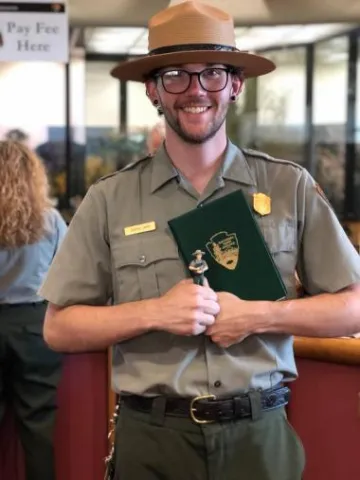
How did you first hear about The Bio/Diversity Project?
Jordan first heard about The Bio/Diversity Project during a meeting with his academic advisor at the University of Arizona. He took home a flyer and thought “you never know if it will be a good fit...” before he submitted an application.
What was the most rewarding part of the internship?
Jordan recalls an experience he had while teaching at Robert Nailers Middle School. Students were asked to draw or write what a scientist means to them. Initially, students were drawing what Jordan had expected, such as Albert Einstein or generally a crazed, white, older, male scientist. Toward the end of the semester, when Jordan presented his assignment to his students for a second time after learning about the diversity of scientists who study biodiversity, students drew themselves as scientists. One student even drew Jordan as a scientist. This experience was one of the small moments that made a lasting impact.
What was the most challenging part of the internship?
Jordan expressed that one of the biggest challenges of The Bio/Diversity Project was commuting to and from Robert Nailer Middle School. At the beginning of the semester, Jordan rode his bike an hour each way to teach his K-12 students.
Tell us a little about your current position.
Since completing the Bio/Diversity internship Jordan has worked with the Biosphere 2 as a summer camp counselor and now works at Saguaro National Park West as a Park Ranger. This role is focused directly on visitor interaction, including answering any questions from visitors, creating and presenting educational programs, and leading guided hikes throughout the park. Jordan also served as a media specialist, which involves creating new media (ie: designing the new hiking guide!), and leading the YouTube and Instagram accounts.
What skills, knowledge, or connections did you gain by being an intern with The Bio/Diversity Project that helped you get to where you are today?
Patience. No matter the circumstance, it is vital to have patience with people. Jordan already has a big family (including 30 nephews and nieces), and participating in The Bio/Diversity Project helped refine his patience and take it to the next level.
Teaching K-12 students as an intern also helped Jordan plan for long-term goals. Rather than just setting objectives for teaching K-12 students, Bio/Diversity interns learned how to map out semester-long lesson plan scope and sequence. Jordan says that this process has helped with both event-planning and organizing hikes in his current position as a Park Ranger.
While The Bio/Diversity Project is an environmental science outreach program, it also aims to foster diversity and inclusion in the environmental workforce. Since being part of the program, have you had the opportunity to continue working to foster diversity and inclusivity in any way (e.g., through your job, volunteer activities, etc)?
Jordan tries to create inspiration for Junior rangers as best he can because he feels that they are truly the next generation of the National Park Service. One of his favorite methods for inspiring the public to view things differently is to talk about the Sonoran Spotted Whiptail; an all female, parthenogenetic, lizard species. This has always helps spark a good conversation (whether focused on society or biology).
Jordan says that he also takes his role as a social media lead seriously in regards to diversity. He tries to include as many different identities and demographics as he can in order to inspire and motivate a wide variety of folks to visit the park. He remarks that one week he was very happy with in particular was International Week of the Deaf. We posted videos and images all week with information/content in American Sign Language. Jordan said that this project not only helped them reach those who might not consider visiting the park, but it also encouraged staff at Saguaro National Park to learn another language in order to be able to communicate with a wide audience.
What would you say to someone who is considering participating in The Bio/Diversity Project?
Don't let an opportunity go by. Just because it may not seem like a perfect fit, doesn't mean you won't fit in. This opportunity helped Jordan grow in ways that he had never planned. He says that sometimes you just have to take the leap. The Bio/Diversity Project staff helped to develop an amazing cohort of interns that were supportive, trusting, and inspiring; they made the leap worth it.
What’s next for you?
Jordan is currently a senior at the University of Arizona and is looking forward to graduating with his Bachelors of Science in the Spring of 2020. He aspires to continue working for Saguaro National Park in the future, while expanding on his visual media and graphic design skill-set.

